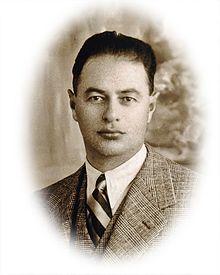sport.wikisort.org - Athlete
Árpád Weisz (Hungarian pronunciation: [ˈaːrpaːd ˈvɛis]; also spelt Veisz; 16 April 1896 – 31 January 1944) was a Hungarian Olympic football player and manager. Weisz was Jewish,[4][2] and was murdered with his wife and children by the Nazis during the Holocaust in World War II at Auschwitz.[5]
 | |||
| Personal information | |||
|---|---|---|---|
| Full name | Árpád Weisz | ||
| Date of birth | 16 April 1896 | ||
| Place of birth | Solt, Austria-Hungary | ||
| Date of death | 31 January 1944 (aged 47) | ||
| Place of death | Auschwitz-Birkenau, Germany | ||
| Position(s) | Left winger[1][2] | ||
| Senior career* | |||
| Years | Team | Apps | (Gls) |
| 1922–1923 | Törekvés SE | ? | (?) |
| 1923–1924 | Makabi Brno | ? | (?) |
| 1924–1925 | Alessandria | 6 | (1) |
| 1925–1926 | Internazionale[3] | 10 | (3) |
| National team | |||
| 1922–1923 | Hungary | 7 | (0) |
| Teams managed | |||
| 1926–1928 | Internazionale | ||
| 1929–1931 | Internazionale | ||
| 1931–1932 | Bari | ||
| 1932–1934 | Internazionale | ||
| 1934–1935 | Novara | ||
| 1935–1938 | Bologna | ||
| 1938–1940 | Dordrecht | ||
| *Club domestic league appearances and goals | |||
Career
Playing career
Weisz played club football as a left winger in Hungary for Törekvés SE,[2] in Czechoslovakia for Makabi Brno, and in Italy for Alessandria and Internazionale.[6]
Weisz earned seven international caps between 1922 and 1923, and was a member of the Hungarian squad at the 1924 Summer Olympics in Paris.[7] A serious injury cut short his playing career.[1]
Coaching career
After retiring as a player in 1926, Weisz became an assistant coach at Alessandria before moving to F.C. Internazionale Milano, where at the age of 34 he won one championship in the 1929–1930 season.[8][2][9] Weisz had three separate spells as manager of Inter, 1926–28, 1929–31, and 1932–34, managing Giuseppe Meazza among his players. He also coached Bari, Novara and Bologna, where he won two league titles (in 1936 and 1937) before he was forced to flee Italy with his wife and two children following the enactment of the Italian Racial Laws.[10][11][12] Weisz finished his career by coaching FC Dordrecht in the Netherlands,[11] leaving in 1940 following the outbreak of the Second World War.[6]
Four years later he was arrested by the SS and murdered by the Nazis at Auschwitz concentration camp, with his family of four (including his wife Elena, his son Roberto, and his daughter Clara) when they were gassed immediately upon arriving at Birkenau.[9][5]
Legacy
In January 2020, Chelsea FC unveiled a mural by Solomon Souza on an outside wall of the West Stand at Stamford Bridge stadium. The mural is part of Chelsea's 'Say No to Antisemitism' campaign funded by club owner Roman Abramovich. Included on the mural are depictions of footballers Julius Hirsch and Weisz, who were killed at Auschwitz concentration camp, and Ron Jones, a British prisoner of war known as the 'Goalkeeper of Auschwitz'.[13]
References
- Costantino, Sostene (27 February 2018). "Arpad Weisz: the Auschwitz victim who helped shape the idea of modern football". These Football Times. Retrieved 27 February 2019.
- Bolchover, David (18 May 2017). The Greatest Comeback: From Genocide To Football Glory: The Story of Béla Guttman. Biteback Publishing. ISBN 9781785902642 – via Google Books.
- "Arpad Weisz | Players | F.C. Internazionale | inter.it". FC Internazionale - Inter Milan.
- "Reference at www.thejc.com".
- Grunwald-Spier, Agnes (7 January 2016). Who Betrayed the Jews?: The Realities of Nazi Persecution in the Holocaust. The History Press. ISBN 9780750958011 – via Google Books.
- "Remembering the remarkable Arpad Weisz". Eurosport. 15 January 2013.
- "Árpád Weisz". Olympedia. Retrieved 23 August 2021.
- "Remembering the cream of Jewish footballing talent killed in the Holocaust". The Guardian. 6 May 2019.
- "Who was Arpad Weisz?". Inter Official Site.
- "Bologna pay tribute to Holocaust victim Arpad Weisz | Paddy Agnew". 30 January 2018.
- Bliss, Dominic (1 December 2014). "Erbstein: the triumph and tragedy of football's forgotten pioneer". Blizzard Media Ltd – via Google Books.
- Hooper, John (8 September 2015). The Italians. Penguin. ISBN 9780525428077 – via Google Books.
- "Chelsea unveils mural with Jewish soccer players murdered at Auschwitz". The Jerusalem Post.
External links
На других языках
- [en] Árpád Weisz
[fr] Árpád Weisz
Árpád Weisz, né le 16 avril 1896 à Solt et mort le 31 janvier 1944 à Auschwitz, est un footballeur international hongrois qui évoluait au poste d'attaquant avant de devenir entraîneur.[it] Árpád Weisz
Árpád Weisz, a volte italianizzato in Arpad Veisz (Solt, 16 aprile 1896 – Auschwitz, 31 gennaio 1944), è stato un calciatore e allenatore di calcio ungherese. Dopo una breve esperienza calcistica nel campionato italiano degli anni 1920, iniziò una brillante carriera di allenatore vincendo uno scudetto con l'Ambrosiana, ad appena trentaquattro anni, e altri due con il Bologna. In quanto ebreo fu vittima delle leggi razziali in Italia. Rifugiatosi nei Paesi Bassi, con l'occupazione tedesca durante la seconda guerra mondiale fu arrestato e deportato dapprima nel campo di transito di Westerbork, successivamente ai campi di lavoro e infine ad Auschwitz, dove trovò la morte per mano nazista.[2][3][4][5][ru] Вейс, Арпад
Арпад Вейс (венг. Weisz Árpád, итал. Arpad Veisz; 16 апреля 1896, Шольт — 31 января 1944, Освенцим, Верхняя Силезия) — венгерский футболист и тренер. Соавтор[1] книги «Игра футбол».Другой контент может иметь иную лицензию. Перед использованием материалов сайта WikiSort.org внимательно изучите правила лицензирования конкретных элементов наполнения сайта.
WikiSort.org - проект по пересортировке и дополнению контента Википедии